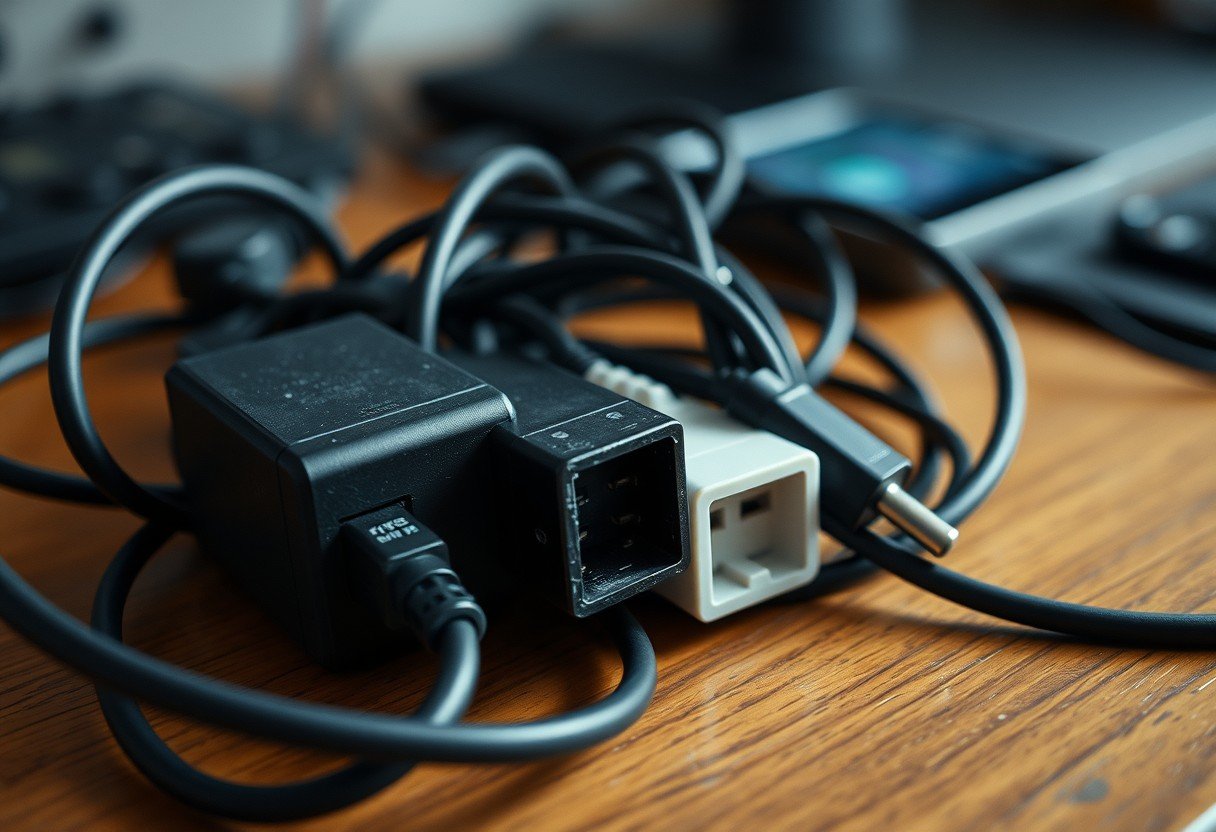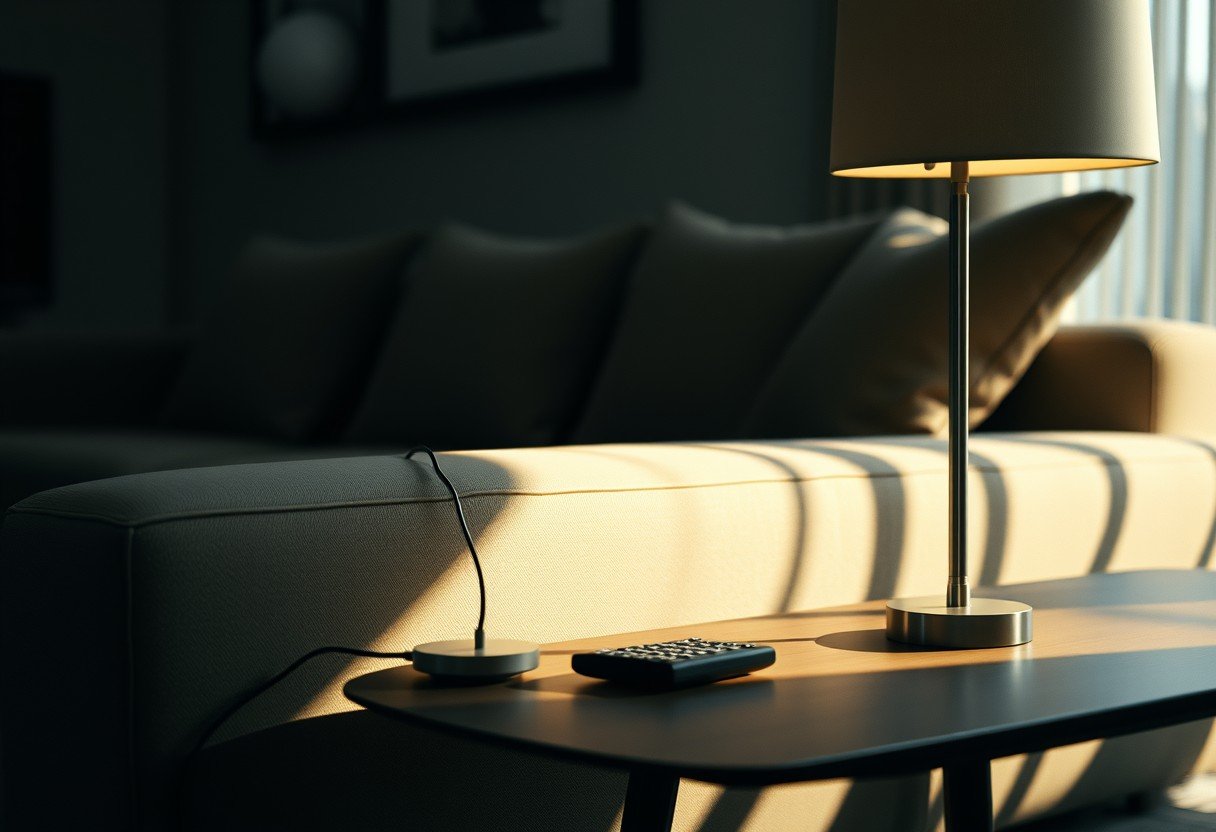It’s a common question: can using an extension cord to charge your phone, laptop, or other devices cause damage? While extension cords are incredibly convenient, using the wrong one or using it improperly can certainly pose risks. These issues range from slow charging to overheating and even permanent damage to your charger or device. Understanding how to choose and use an extension cord safely is key to protecting your electronics and ensuring they have a long, functional life.
Understanding the Risks: How Extension Cords Can Harm Your Charger
The primary danger of using an extension cord with a charger comes down to two main issues: overheating and voltage drops. These problems are often linked and can create a hazardous situation for your electronics.
When an extension cord is not rated to handle the amount of power your charger is drawing, it can become dangerously hot. This is especially true for low-quality or thin-gauge cords. This heat can damage the cord’s insulation, the charger itself, and even create a fire hazard.
A “voltage drop” is another significant risk. Electricity loses some of its force as it travels over a wire, and this effect is more pronounced in longer or thinner cords. If the voltage drops too much by the time it reaches your charger, the charger may not receive enough power to function correctly. This can lead to inefficient, slow charging and cause the charger to work harder, which generates excess heat and can shorten its lifespan over time.
Not All Cords are Created Equal: Choosing the Right One
Selecting the right extension cord is the most important step in preventing damage. Not every cord is suitable for every task. You need to consider its type, safety certifications, and physical specifications to ensure it can handle the load from your chargers.
Always look for a safety certification mark on the packaging, such as UL (Underwriters Laboratories) or ETL (Edison Testing Laboratories). These marks indicate that the cord has been tested and meets minimum safety standards. Without this certification, you have no guarantee of the cord’s quality or safety.
Different types of extension cords are designed for specific environments and power loads. Using an indoor cord for outdoor applications, for example, is a serious safety risk as it lacks the weather-resistant features needed to prevent electrical shorts.
| Cord Type | Primary Use |
| Indoor | For light-duty use inside with small appliances and electronics. |
| Outdoor | Features durable, weather-resistant jackets for outdoor tools and lighting. |
| Heavy-Duty | Designed for high-power equipment like power tools and major appliances. |
| Power Strip | Provides multiple outlets and often includes surge protection for electronics. |
Matching the Cord to Your Device’s Needs
Beyond the basic type, you must ensure the extension cord’s electrical ratings are compatible with your charger. Every charger has specific voltage and current (amperage) requirements to operate safely. Using a cord that can’t meet these demands is a recipe for trouble.
The cord’s “gauge” is a critical factor. This number indicates the thickness of the wire inside; counterintuitively, a lower gauge number means a thicker wire that can carry more power safely. For most charging applications, a 14-gauge or 16-gauge cord is sufficient, but for high-power devices like gaming laptops, a thicker 12-gauge cord might be a better choice.
Here are a few things to check to ensure compatibility:
- Amperage Rating: The extension cord must have an amp rating equal to or greater than the device you are plugging into it.
- Wattage Capacity: Similarly, ensure the total wattage of all devices doesn’t exceed the cord’s maximum wattage capacity.
- Length: Use the shortest cord possible for your needs. Longer cords have higher resistance and are more prone to voltage drops.
Safe Charging Habits: Best Practices for Using Extension Cords
Once you’ve chosen the right cord, using it correctly is just as important. Proper setup and regular maintenance can prevent most of the risks associated with charging through an extension cord.
First, always fully uncoil the extension cord before use. Leaving it coiled up can trap heat, creating a significant fire risk, especially when charging power-hungry devices. Also, position the cord where it won’t be a tripping hazard or be crushed by furniture or doors, as physical damage to the insulation can expose live wires.
Ensure the area around your charger and the extension cord connections has good ventilation. Avoid placing them on soft surfaces like a bed or couch, or covering them with blankets, as this also traps heat. Regularly inspect your extension cords for any signs of wear and tear, such as cracks, frayed wires, or loose connections. If you find any damage, stop using the cord immediately and replace it.
When Your Charger Feels Hot: What to Do and Why it Happens
It’s normal for a charger to feel slightly warm during use, but if it becomes uncomfortably hot to the touch, it’s a warning sign. An excessively hot charger is often a symptom of it working too hard, which can be caused by using an inadequate extension cord.
If your charger gets too hot, the first thing you should do is unplug it from the extension cord and the wall outlet immediately. Let it cool down completely. Before using it again, check that your extension cord is properly rated for the charger. If the problem continues even when plugged directly into a wall outlet, the charger itself may be faulty and should be replaced.
Smarter Alternatives to Using Extension Cords
While extension cords are useful for temporary situations, relying on them long-term is not ideal. Fortunately, there are safer and more permanent solutions for getting power where you need it.
- Power Strips with Surge Protection: A high-quality power strip is often a better choice than a simple extension cord. It provides multiple outlets and, crucially, can offer surge protection to safeguard your electronics from voltage spikes.
- Multi-Port Wall Chargers: Instead of using multiple chargers with an extension cord, consider a single wall charger with several USB ports. This reduces clutter and the overall load on one outlet.
- Installing Additional Outlets: The safest long-term solution is to have a licensed electrician install new electrical outlets exactly where you need them. This eliminates the need for extension cords entirely, providing a more secure and reliable power source.
This option is more expensive upfront but is the best investment for safety and convenience in areas where you frequently charge multiple devices.
Frequently Asked Questions about Extension Cords and Chargers
Do extension cords slow down charging speed?
Yes, they can. A long or thin-gauge extension cord can cause a voltage drop, which means your charger receives less power. This can force your device to charge more slowly than it would if plugged directly into a wall outlet.
Is it safe to charge multiple devices from one extension cord?
It can be, but you must check the cord’s capacity. Add up the power requirements (amps or watts) of all the chargers you want to plug in. This total must not exceed the extension cord’s maximum rating to avoid overloading it.
What kind of extension cord is best for chargers?
For most phone and laptop chargers, a 14 or 16-gauge indoor extension cord is a good choice. Look for one that is UL or ETL certified and is as short as you need. For more powerful devices, a heavier-duty 12-gauge cord is safer.
Can I plug a power strip into an extension cord?
This is generally not recommended by safety experts. Plugging a power strip into an extension cord, also known as “daisy-chaining,” can easily overload the extension cord or the wall outlet, creating a serious fire risk. It is much safer to plug the power strip directly into the wall.









Leave a Comment